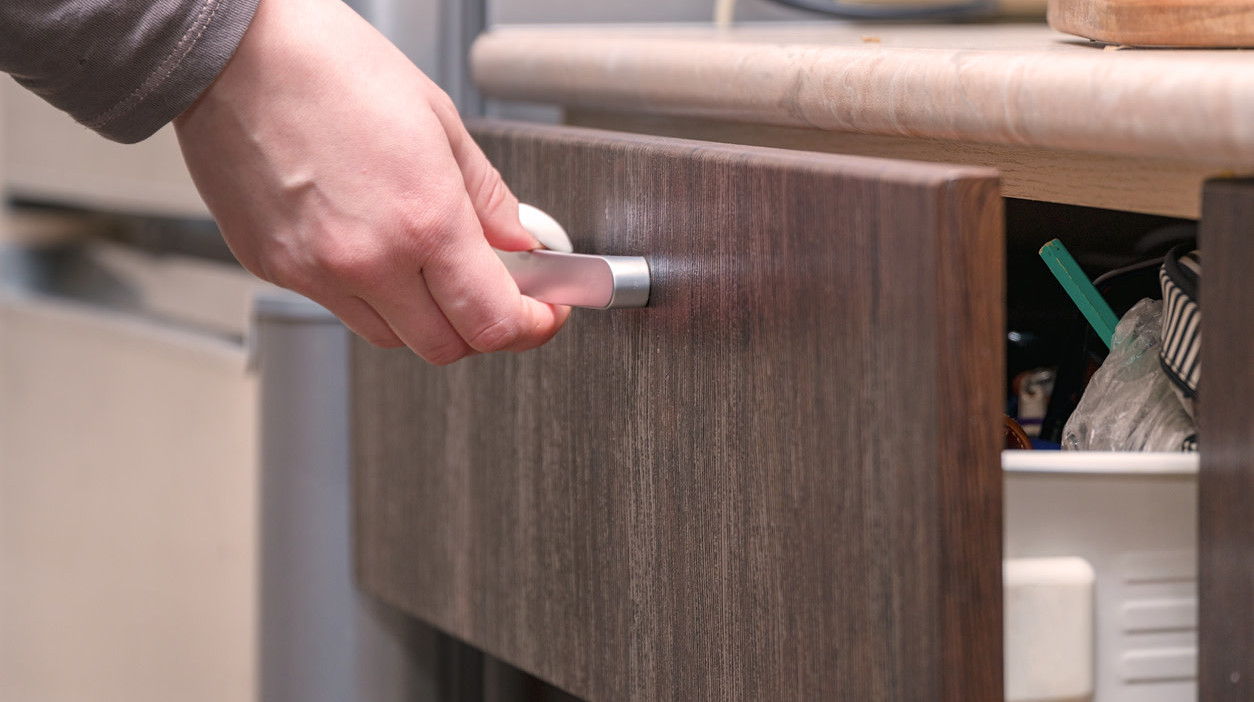Every Office Worker Needs A Snack Drawer
I once worked in an office with a cereal bar and a refrigerator full of milk and fruit. There was a candy room (more of an alcove really, but still marvelous), a freezer full of ice cream, and a bath scale, which struck me as a bit passive-aggressive when I bothered to notice it was there. Later they installed a SodaStream machine. It was paradise! Whenever you were hungry or if you'd forgotten your lunch and didn't feel like an overpriced sandwich, there was always more cereal. And gummies, because all the chocolate in the candy room usually disappeared immediately.
And then, the 21st-century media landscape being what it is, all these things gradually disappeared and we moved to another building with no cereal, and then another that lacked basic features like windows, let alone a candy room. But that meant when we got drawers, we were excited and grateful that we didn't have to keep our things in cardboard boxes anymore. And I decided this clean, empty drawer gave me the perfect opportunity to stock up with my own snacks.
Now the snack drawer is a regular feature of every office I work in. I hoard whatever candy I can get my hands on and other nonperishable treats, like store-bought cookies that mysteriously never go bad. I have nuts. I have a jar of nut butter (peanut most of the time, but I switched to almond during the period when someone in the office had a peanut allergy). I have crackers. I have granola bars. My snack drawer usually makes me very happy, except for the times when I eat something and then am desperately hungry again 20 minutes later. So I called up an expert, Michele Fumagalli, a dietician at Northwestern Medicine Running Medicine Clinic, to find out how I could fill my snack drawer with foods that were filling and energy-boosting but not irredeemably junky.
Fumagalli assured me that getting hungry again 20 minutes after eating an apple is not the moral failing I feared it was. "While apples and bananas are good and nourishing," she says, "you need to balance it out so it'll last longer. You need protein."
An apple or a banana with nut butter is good and will make you feel fuller for longer. So will fruit mixed with cheese or nuts or roasted chickpeas, or even whole-wheat crackers or a wrap or rice cakes. Fumagalli is very open-minded about what constitutes a snack. "A snack can be a sandwich. A snack can be a smaller portion of a meal. If we're hungry, let's eat something."
One of Fumagalli's own personal favorite snacks is trail mix. But not all trail mixes, she warns, are created equal. Some have more sugar than others. She has a particular preference for Trader Joe's Omega Trek Mix, which comes in individual packages that keep you from absentmindedly eating an entire bag. If you're feeling fancy and have a refrigerator, you can mix it with yogurt.
Fumagalli also really likes oatmeal. "I just had some this morning," she says. She likes to mix up her own in plastic bags: rolled oats (she prefers their texture to that of quick oats), cinnamon, nuts, and some brown sugar or honey for sweetness. Mix it with milk or water, put it in the microwave for 90 seconds, and voila! oatmeal.
Another good office snack is nuts: almonds or cashews or Brazil nuts or peanuts or all of them mixed together so you don't get bored. Fumagalli warns that nuts can be as addictive as potato chips, particularly while you're distracted by something on your computer. "Your hand just wants to go in that bag." So maybe measure them out first. (At this point, I thought about the story of how President Obama allotted himself just seven almonds while he did his evening paperwork and how sorry I felt for him until I learned it was just a joke.)
Fumagalli doesn't exactly scorn protein or granola bars, but she does view them as more of a last resort: "If we don't have anything, take that out and eat it." She warns that you should read labels very carefully, especially since there are hundreds and hundreds of protein bars to choose from. She thinks Epic Bars are okay. So are Lärabars. She also enjoys 88 Acres Seed Bars.
But Fumagalli, although she is a nutritionist, is also a human being, and she understands the pain of the mid-afternoon post-lunch sugar crash when you just want something sweet. Therefore, it's totally all right to keep chocolate in your desk! "It's not restricting yourself," she says, "it's respecting yourself." But it's even more respectful to yourself to consume it responsibly, one square or small handful of chocolate-covered almonds at a time. (Tea is also nice at this time of day, especially if you're old like me and need to sleep later.)
January, when everyone is in the fever of self-improvement, Fumagalli agrees, is a fine time to begin stocking one's snack drawer. Maybe if you begin the year with healthier snacks, the habit will continue. Especially if they actually make you feel full and happy. But there is one thing she said that I know will stick with me, even after I finish off my new bag of trail mix: "It's always better to have more snacks than not enough."
